The sacrament of wedding is the conclusion of marriage in the Orthodox Church. The newlyweds receive a blessing from the priest for their future family life. Only baptized and believing people can get married.
First you need to prepare for such an event spiritually. And approach this consciously. After all, young people will be responsible before God for their deeds and thoughts. You shouldn't do it because your neighbors did it.
After the wedding, people will not be able to dissolve their marriage. This also needs to be thought about in advance.
Wedding is one of the seven sacraments of the Russian Orthodox Church
This ceremony is performed in the presence of witnesses and guests. But many people wonder, is it possible to get married without witnesses? Let's try to figure this out.
The role of witnesses at a wedding is rather a tribute to a long tradition
Previously, when marriage consisted only of a wedding ceremony, the role of witnesses was very important. People signed in the parish register in the church that they could marry by mutual consent.
But now, rather, the role of witnesses at a wedding is not so important. If the young people do not have someone whom they could invite as a witness, then the ceremony takes place without them. It is necessary to notify the priest in the church where the newlyweds are going to get married in advance.
The newlyweds can invite guests to the sacrament of wedding.
There have been cases when the bride and groom wanted to get married secretly so that no one would know. Actually this is wrong. It is necessary to obtain the blessing of the parents, and then the permission of the priest.
Many also ask questions: how to choose the right witnesses, who should they be? Who can be taken as witnesses and who cannot? All these questions also have their own answers.
Traditions and rules of wedding
The church is unique in that it preserves all the traditions and rules that have appeared since ancient times. They are not changed at all, but only correspond to them. The time during which the ceremony is performed does not exceed 60 minutes. Basically it takes from 40 minutes to 1 hour depending on the clergyman and the church where all this is held.
A mandatory rule for everyone wishing to register their relationship is the need to be baptized. Both witnesses and newlyweds must be baptized and religious people. Please note that you can be baptized even a few days before the sacrament.
The day before the wedding, the young family must come to church to receive communion and confession. It would be useful to do the same for witnesses and other guests. However, this is not a prerequisite for the ceremony.
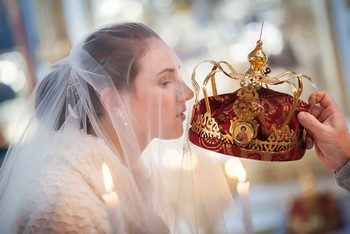
You should also adhere to the rules regarding appearance. They relate most to women. They are forbidden to wear trousers and bare heads in church. The ideal outfit is a long skirt and scarf.
Under no circumstances should women wear revealing or large necklines that are provocative. If one of the ladies present violates such a rule, then the clergyman may completely refuse the newlyweds to perform the ceremony. Therefore, a week or two before the ceremony, it is worth consulting everyone present regarding their appearance at the celebration.
According to traditional church canons, a wedding includes several important stages.
- Betrothal is the very first step, which takes place at the threshold of the central hall. The priest reads prayers, baptizes the newlyweds and betroths them. From now on, a girl and a young guy can be considered husband and wife.
- Wedding - during which the priest reads prayers, they are repeated by the newlyweds and witnesses. The husband and wife drink Cahors and walk around the sacred place. All this symbolizes the entry into a new family life.
- Permission - the priest in the third stage asks God to preserve the newly formed family for many years of happy family life. To commemorate such a request, the priest asks the newlyweds to kiss the icons they had prepared in advance. The man kisses the icon of Christ, and the bride kisses the Mother of God.
- Thanksgiving - everyone present takes turns thanking God for allowing such a union to take place and promising to give them a long and happy family life. At the end of the wedding ceremony, church bells ring. At this time, the newlyweds leave the cathedral.
In any church, a wedding takes place using important 4 stages. The exclusion of one of them means an incorrect ceremony, which may even be considered invalid.
Witnesses at a wedding are believers and responsible people
Witnesses are the spiritual mentors of the newlyweds.
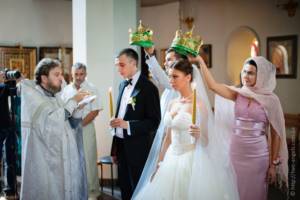
Witnesses hold crowns over the heads of those getting married
Who can be a witness at a wedding:
- a believer and responsible person;
- taking marriage and weddings seriously.
Who you need to take as witnesses is something you must decide for yourself. This could be a married couple, unmarried friends, or just young friends.
Who should not be taken as witnesses:
- people who are divorced, because they once destroyed their marriage and cannot be mentors to the couple;
- people who live together, but not in a registered marriage, are considered to be living in sin;
- unbaptized people;
- people of a different religion. This option is possible if this person converted to Orthodoxy before the wedding.
Every believer must wear a cross.
Parents can also be witnesses at a wedding.
Only they must be married. And if they also get married, then that’s also good, but if not, then it’s not necessary.
See also the article Is it possible to fast before Easter?
Who to choose as assistants to the bride and groom?
In the modern world, many do not thoroughly observe all the rules and traditions of church rites. However, a wedding is a special sacrament. In order for the ceremony to become more than just a tribute to fashion, it is important to follow church canons and pay special attention to the choice of successors.
For this role, only sincerely believing Orthodox people are invited, who can become the spiritual mentors of the spouses. Witnesses must be allowed to enter the young couple's house. It is important that there is a close, trusting relationship between spouses and guarantors.
It is best to choose a pious married couple as successors, who can become an authority for the young. If there are no such people in your close circle, the role of friend and friend is offered to close friends.
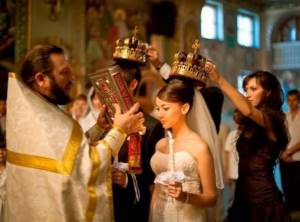
It is also worth considering that during the ceremony, the guarantors hold crowns over the heads of the bride and groom, so it is worth paying attention to the height and physical characteristics of the candidates for the role of witnesses. After all, the wedding ceremony lasts about an hour, and the crown is quite difficult to hold in weight for a long time.
Important! A couple who was not married before participating in the ceremony will subsequently not be able to get married. By taking on the role of guarantors, witnesses become spiritual relatives.
The church prohibits a number of persons from taking on the duties of successors. These include:
- divorced people;
- a couple living in a civil marriage;
- parents of the bride and groom;
- representatives of other religions;
- unbaptized.
On the eve of the wedding, everyone should partake of the Holy Mysteries of Christ
Each of the newlyweds must confess and receive communion on the eve of the wedding. And also fast and read prayers.
A woman should look appropriate, preferably as modest as possible. She should be wearing a dress or skirt, preferably below the knee, with a scarf on top.
Men entering the temple must take off their hats. You should wear trousers and preferably a shirt.
Also an important point for women. You cannot enter the temple during critical days. Therefore, the wedding day must be calculated in advance so that it does not fall on these days.
Schedule your wedding for safer days. This also applies to the witness; she should also discuss this with the bride in advance.
In the temple you must behave quietly, not talk, listen to prayers and chants.
When the day and time of the wedding have been discussed, the newlyweds need to purchase wedding icons - the Most Holy Theotokos and Jesus Christ.

Wedding Icons of the Blessed Virgin Mary and Jesus Christ
Witnesses can also purchase them as a gift to the newlyweds.
Rules
Particular attention is paid not only to the behavior of witnesses during the ceremony, but also to the period of preparation for the wedding. What do the successors do before the sacrament? They need to take communion the day before, confess, and on the day of the wedding fast and renounce carnal pleasures.
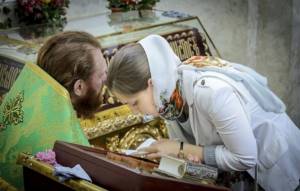
During the ceremony, witnesses, like other guests, must adhere to certain rules of conduct:
- You can't be late. The guarantors arrive at the church in advance and take their places near the newlyweds;
- Before the ceremony, mobile phones are turned off;
- You cannot talk or laugh loudly in church;
- Do not turn your back to the iconostasis in church;
- On the wedding day they pray only for the happiness and health of the newlyweds. To light candles for the health of relatives or for the repose of the deceased, you should choose a different time;
- You should not sit on benches in church during services. Seating is reserved for sick and infirm people only.
Important! All wedding participants must be baptized or undergo baptism in advance.
After the ceremony in the temple, the newlyweds often arrange a banquet for the guests. During the celebration, it is customary for the successors to behave calmly and humbly. Heavy drinking of alcohol, dancing and wild fun on the part of witnesses are not welcome on this day.
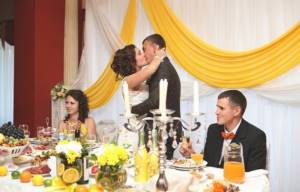
The crown above the bride is held by a woman, above the groom - by a man.
There are no strict rules about who should hold the crowns over the heads of the newlyweds.
The established tradition is that the bride is held by a woman, a friend. And to the groom, a man, a comrade, a friend.
But it is necessary to keep it all the time while the wedding is taking place. You cannot lower the crown; the hand holding the crown can be changed. Because holding the crown at arm's length for forty minutes will not be easy for anyone.
But what about the crowns if the wedding takes place without witnesses? It's actually simple. In this case, the crowns are simply put on the head.
In this photo, the newlyweds have no witnesses, so they put the crowns on their heads
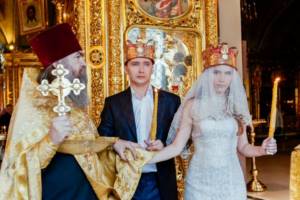
As you can see in the photo, the wedding ceremony takes place exactly the same if there were witnesses here.
Is it possible to get married without them?
Today, the tasks of guarantors do not include documenting the wedding ceremony and leaving signatures in the registry book. Their main responsibility is spiritual guardianship over the family that has undergone the wedding ceremony.

In the absence of witnesses, there is no one to hold the wedding crowns, but this is not a problem. The crowns are simply placed on the heads of the bride and groom.
Parents are only witnesses and prayer providers for their children.
Also interesting is the fact that what role is assigned to the parents of the newlyweds at the wedding. Among other nations, before the wedding of his daughter, the father joined her hands and handed them over to the groom. This meant that the bride's family would hand over their child to the groom's family.
Only an echo of that remains in Orthodoxy. Before the wedding, the priest joins the hands of the newlyweds. Holding the hands of the bride and groom, he leads them around the temple, going around the lectern three times.
And the parents are just ordinary guests, witnesses to the wedding.
Dress code
The wedding ceremony requires an appropriate appearance not only from the bride and groom, but also from their successors. When it comes to bridesmaid attire, it definitely can't be pants. The witness's clothing should be modest. Skirts and dresses above the knee are not allowed. Shoulders and neckline should be covered with a cape or poncho.
Important! Witnesses must wear a cross. As a last resort, wear it during the ceremony.
A headdress is required for the witness, as well as for other women present. The successor should also pay attention to the color of the dress. It should not match the color of the bride's wedding dress.
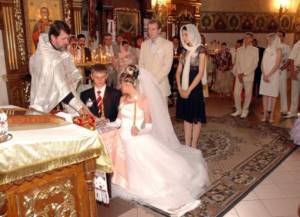
Many people give gifts at weddings, just like at weddings.
After the wedding in the church, the newlyweds are also given gifts. Most often they give:
- wedding icons;
- Gospel;
- prayer books;
- lamp;
- wedding candles.
Many people give gold pendants with images of saints. And also household items:
- bed sheets;
- tea-set;
- set of pans;
- household appliances.
That is, they give what they give for a wedding.
Getting married is a huge responsible step for newlyweds. Now you have an idea of how this ceremony takes place and whether witnesses are needed at the wedding. Each Orthodox church has its own rules.
In some churches they may allow you to get married without witnesses, and in others only with witnesses. But everything must be discussed in advance with the parish priest.
By leaving a comment, you accept the user agreement
Present
Despite the opinion that it is not necessary to give wedding gifts, I would like to please the newlyweds with something special on this day. You can present a common gift from witnesses or make gifts separately. To ensure that the heroes of the occasion are sure to like the gift, it is better to casually ask what they would like to receive.
A good gift for newlyweds would be figurines-amulets in the form of angels, which symbolize the unification of two hearts. An icon purchased in a store or embroidered yourself can also be presented as a souvenir.
Often given as a wedding gift is a photo album or a pair of silver cups with names and the date of the ceremony engraved on them.
An original gift for witnesses would be a portrait of the newlyweds or a wedding cake with a corresponding image. Also, the successors can pay for part of the wedding ceremony as a gift.
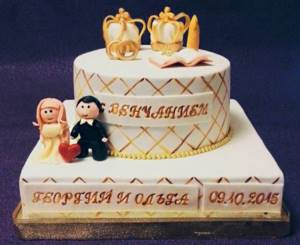
Who cannot be a guarantor at a wedding sacrament?
Witnesses at a wedding cannot be :
- Those who are divorced because they have destroyed their marriage and cannot vouch for the well-being of the family life of others.
- Those who cohabit in an unregistered marriage because they live in sin, which is displeasing to the church.
- Unbaptized in the Orthodox faith. If they belong to another religion, then they cannot be witnesses at an Orthodox wedding. But if they underwent baptism before the wedding, the priest can allow them to participate in the sacrament.
Also, witnesses must be believers and wear a cross. Who can be called as witnesses? A married couple or unmarried friends or friends of the newlyweds can act as guarantors.
only family people familiar with marriage were called as guarantors , since witnesses became, as it were, the wedding parents of the marrying couple, just as godparents become parents of a baptized child.
The spiritual responsibility resting on these people is very high
However, the main burden of responsibility for their marriage lies with the newlyweds.
The answer to the question whether parents can be witnesses is positive, provided that they are in a registered marriage. The fact that they are married will be an additional plus, but this is not a necessary condition.
Immediately on the eve of the wedding, each of the guarantors must confess and take communion, fast and devote time to prayer. Also, the requirements of the Orthodox Church oblige witnesses to look appropriate : women must be modestly dressed, always in a skirt or dress below the knee, their heads must be covered with a scarf, men must remove their headdress.
It is also important that a woman during menstruation is not supposed to enter the temple . This applies to both the bride and the witness. If possible, it is better to set the wedding date on days that are safe from the point of view of the female cycle.
In church it is considered unacceptable to cross your arms in any position or stand with your back to the iconostasis: this is considered disrespectful and a bad omen
In general, one is supposed to behave modestly and quietly , concentrating on prayers and the sacrament. We must remember that any church and temple is the house of God.
Who should hold the crown at the wedding?
There are no strict rules about who exactly should hold the crown over the heads of the newlyweds. This may be a male or female witness. The basic rule is that when holding the crown above the head of the bride or groom, you cannot lower it, you can only change your hand without lowering the crown. The tradition that a man should hold the crown over the groom , and a woman over the bride, came from the practice of the registry office, when a couple of a girl and a guy are sure to act as witnesses. Previously, the boyfriends of young people were exclusively men.
If there are no guarantors present at the sacrament, then the crowns are simply placed on the heads of the newlyweds.











